|
|
|
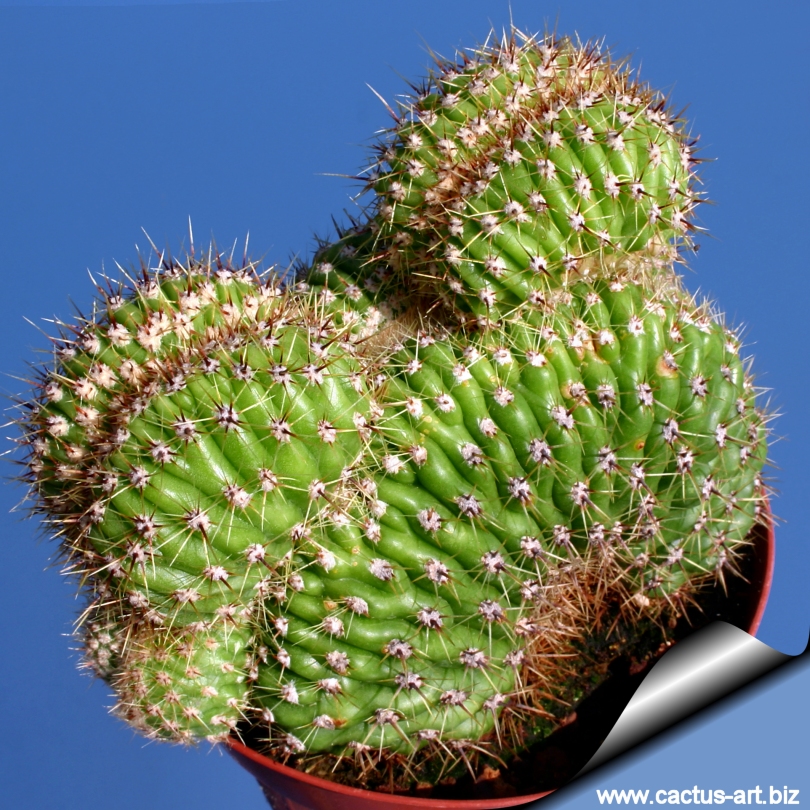
Trichocereus candicans forma
cristata.
Crest or "cristate"
Argentine Giant cactus are special looking
plants. Like brains, the growing point is generally ridge-like instead
of circular.
|
Description:
The typical
Trichocereus candicans
is a clump-forming cactus that resembles the
'torch cactus' but not as tall and does not stand as straight. It
tends to lean on one side and forms pups from the base and on the other
side. It eventually forms a large clump 1 to 3 m
across. The rare crested form can also
get very big making a spectacular specimen.
Stem:
Cylindrical erect or usually spreading
rounded apicallly 12-18 cm across and 40-60(-100) cm long. The stem is
medium green in colour on the shaded side and
yellowish green on the sun baked side.
Ribs:
9-11, obtuse, usually low.
Areoles:
Large white, 2-3 cm
apart.
Spines:
Yellowish to brownish-yellow , somewhat mottled awl shaped.
Central spines:
Numerous up to 10 cm long (but usually less).
Radial spines:
10-12 unequal,
spreading up to 4 cm long.
Flower: Showy, funnelform, bright white on the inside with
yellow centers and pinkish on the outside, very large 18-25 cm from top
to bottom and 11-19 cm across, scales on flower tube ovate, acuminate,
bearing long hairs in their axils. They can be profuse. The fragrance of
the flowers is very strong--perhaps one of the strongest in the cacti
family. The flowers are nocturnal begins to open near sundown and close
in the mid afternoon. It can stay open for two or more days if the
weather is cool and/or cloudy.
Fruit:
Globose to ovoidal, dehiscent,
splitting on one side.
Blooming season: It
usually blooms in late spring, but can be a early as mid March, and
sometimes in September.
|
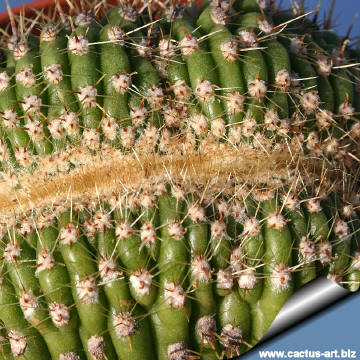 |
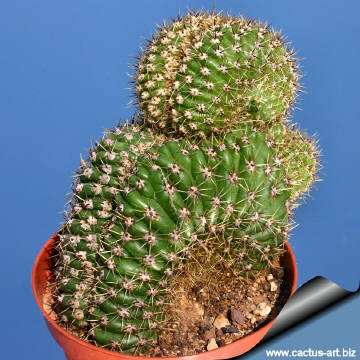 |
|
. |
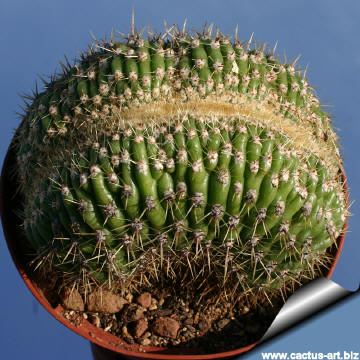 |
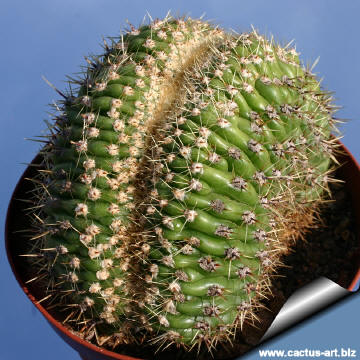 |
|
Propagation: The
way to multiply this cactus is by dividing the main crest in smaller
pieces that can be rooted. It can also be grafted.
|
|
Advertising
|
|
|
|
|
Family:
Cactaceae (Cactus
Family)
Trichocereus candicans
(Gillies ex
Salm-Dyck) Britton & Rose
Publ.
Carnegie Inst. Wash. 248(2):142. 1920
forma cristata
Currently accepted
Scientific name: Echinopsis candicans
(Gillies
ex Salm-Dyck) F. A. C. Weber ex D. R. Hunt
In: Bradleya 5:92.
1987
Common name: Crested
Argentine Giant cactus (The
cactus is from Argentina, and hence the common name 'Argentine Giant
Cactus', both for the size of the flowers, and the size of the mature
plant.)
Origin:
Garden origin (Nursery
produced cultivar)
Conservation status: Listed in
CITES appendix 2.
Synonyms:
- Cereus candicans
Gillies ex Salm-Dyck
- Cereus candicans
var. courantii K.shuman 1897
- Trichocereus
courantii ( K.shuman 1897) Bakeberg 1966
-
Trichocereus pseudocandicans
(Backeberg)
R. kiesling 1976
-
Echinopsis pseudocandicans
(Backeberg) H. Friedrich & Glaetzle
1983
- Echinopsis courantii
-
Trichocereus neolamprochlorus
-
Helianthocereus pseudocandicans
-
Cereus gladiatus
-
Trichocereus candicans var. courantii.
|
|
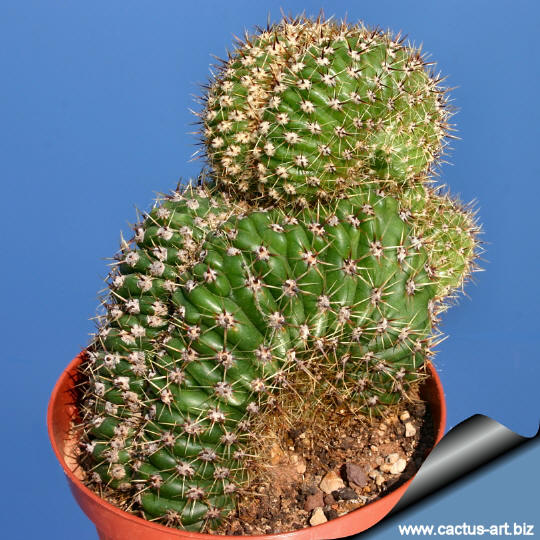
The only way to multiply this cactus is by dividing the main crest
into smaller pieces that can be rooted. It can also be grafted.
|
|
|
|
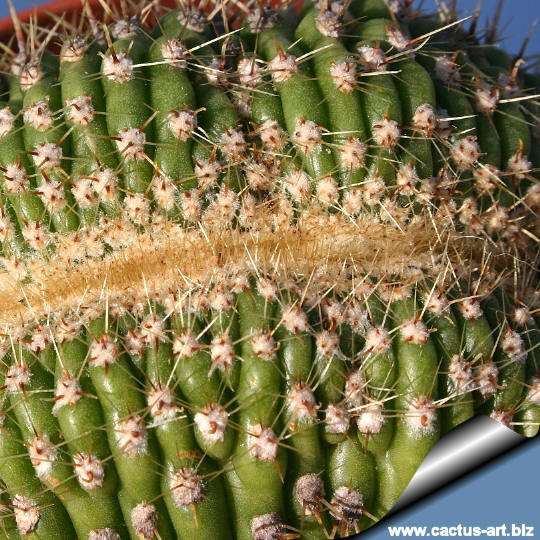
Cultivation: Trichocereus
candicans is very easy to grow and cold hardy as low as -8°C
(or less). It needs a fertile, well drained soil mix. Water the plants
well and allow them to dry before watering again. This species seems to
do better with a little more water than most cacti. In fact, its
cultivation requirements are really more like 'normal' plants than most
other cacti. During the growing season fertilize them monthly with a
balanced fertilizer
Sun Exposure: Outside
full sun, but during hot summers the cactus are subject to sun
burning, so grow them in light shade. Inside they
need bright light, and some direct sun. During winter months,
put them in a cool luminous place and encourage them to enter winter
dormancy by withholding water and fertiliser over the winter,
as they will etiolate, or become thin, due to lower levels of light.
They are susceptible to fungal diseases if over-watered,
but are not nearly as sensitive as many other cacti, especially in warm
weather. They tend characteristically towards black rotted spots unless
watering is moderate and only in hot weather. If
kept damp through cold periods, they will invariably suffer.
T.
candicans produces good amounts of growth each year if kept
well fed and watered throughout the warmest months, particularly if it
has been acclimatised to accept full sun.

 |
|